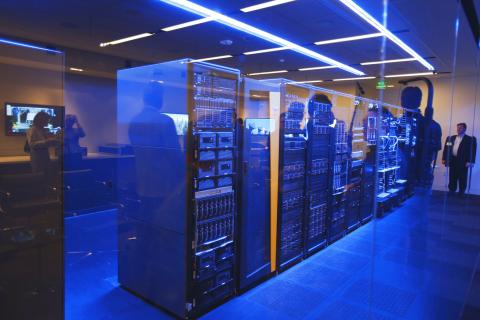Hewlett-Packard Co (HP), the world’s largest personal computer maker, is vowing to crack down on its Chinese suppliers in an effort to reduce the use of low-paid student interns and other temporary workers.
The guidelines unveiled on Friday are the latest attempt by a major US technology company to weed out labor abuses at Chinese factories that manufacture the gadgets for an Internet-connected world.
HP, which is based in Palo Alto, California, said its new standards are meant to ensure that its Chinese suppliers do not lean too heavily on student interns and temporary workers as a way to save money. The company says it wants to protect workers’ rights when they are hired.

Photo: Reuters
The new standards come a few months after Hon Hai Precision Industry Co (鴻海精密), a major Taiwanese manufacturer better known as Foxconn Technology Group (富士康科技集團), acknowledged that it has hired interns as young as 14.
Both HP and Apple Inc, the maker of iPhones, iPads and Mac computers, rely on Foxconn to make some of their products.
Apple, which is based in Cupertino, California, has also been trying to reform the labor practices at Foxconn and other Chinese suppliers in recent years in response to scathing criticism about the inhumane treatment of the workers making devices that have become status symbols, as well as multipurpose tools for communicating, reading, watching video and taking pictures.
Among other things, HP said it hopes its rules will prod its Chinese suppliers to employ mostly full-time workers instead of exploiting interns and temporary employees.
When interns and temps are used, HP said it will insist they are not forced to remain on the job against their will and have the right to file grievances. The company also pledged to ensure intern hours are kept well below the legal limit.
To show it is serious, HP intends to review the labor practices at its Chinese suppliers more frequently.
HP boasts an extensive supply chain that spans more than 45 countries and territories. The company’s stock gained US$0.41, or 2.5 percent, to US$16.85 in afternoon trading on Friday. The shares have traded in a 52-week range of US$11.35 to US$30.

A proposed 100 percent tariff on chip imports announced by US President Donald Trump could shift more of Taiwan’s semiconductor production overseas, a Taiwan Institute of Economic Research (TIER) researcher said yesterday. Trump’s tariff policy will accelerate the global semiconductor industry’s pace to establish roots in the US, leading to higher supply chain costs and ultimately raising prices of consumer electronics and creating uncertainty for future market demand, Arisa Liu (劉佩真) at the institute’s Taiwan Industry Economics Database said in a telephone interview. Trump’s move signals his intention to "restore the glory of the US semiconductor industry," Liu noted, saying that

On Ireland’s blustery western seaboard, researchers are gleefully flying giant kites — not for fun, but in the hope of generating renewable electricity and sparking a “revolution” in wind energy. “We use a kite to capture the wind and a generator at the bottom of it that captures the power,” said Padraic Doherty of Kitepower, the Dutch firm behind the venture. At its test site in operation since September 2023 near the small town of Bangor Erris, the team transports the vast 60-square-meter kite from a hangar across the lunar-like bogland to a generator. The kite is then attached by a

Foxconn Technology Co (鴻準精密), a metal casing supplier owned by Hon Hai Precision Industry Co (鴻海精密), yesterday announced plans to invest US$1 billion in the US over the next decade as part of its business transformation strategy. The Apple Inc supplier said in a statement that its board approved the investment on Thursday, as part of a transformation strategy focused on precision mold development, smart manufacturing, robotics and advanced automation. The strategy would have a strong emphasis on artificial intelligence (AI), the company added. The company said it aims to build a flexible, intelligent production ecosystem to boost competitiveness and sustainability. Foxconn

STILL UNCLEAR: Several aspects of the policy still need to be clarified, such as whether the exemptions would expand to related products, PwC Taiwan warned The TAIEX surged yesterday, led by gains in Taiwan Semiconductor Manufacturing Co (TSMC, 台積電), after US President Donald Trump announced a sweeping 100 percent tariff on imported semiconductors — while exempting companies operating or building plants in the US, which includes TSMC. The benchmark index jumped 556.41 points, or 2.37 percent, to close at 24,003.77, breaching the 24,000-point level and hitting its highest close this year, Taiwan Stock Exchange (TWSE) data showed. TSMC rose NT$55, or 4.89 percent, to close at a record NT$1,180, as the company is already investing heavily in a multibillion-dollar plant in Arizona that led investors to assume